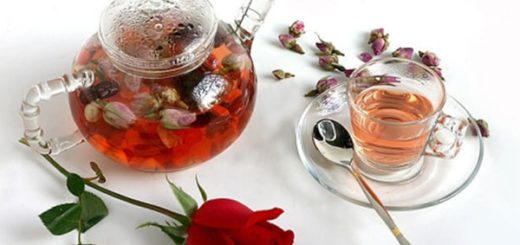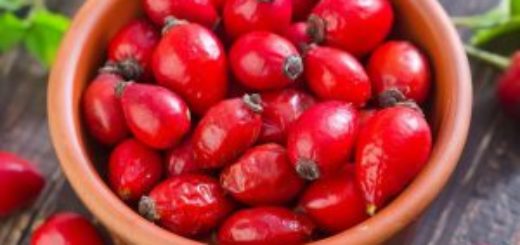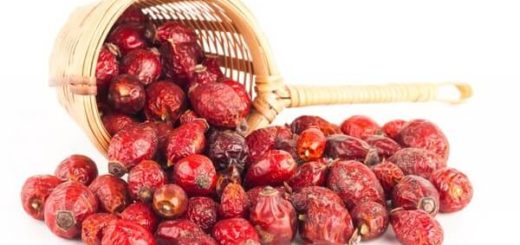Contraindication, useful properties and recipes
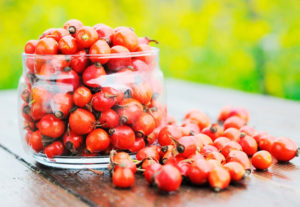
Medicinal properties of rosehip likarskoyi
Useful properties of rosehip and contraindications, accepting.
Dog-rose, the fruits of which are widely used in food and as raw materials for the pharmaceutical industry, has the following properties and very few contraindications.
This plant is widely distributed in temperate and subtropical climates of Europe, Asian countries, Middle East, North America.
Depending on the number and value of pigments (carotenoids, flavonoids, anthocyanins) fruits and flowers can have color from yellow-orange to dark red, can be found even rosehip black.
Fruits and other plant part used as a source of vitamin C and other beneficial compounds for many hundreds of years.
The authorities formally recognize the product as nutritious product and remedy.
So, Classification of production OKPD indicates hips along with apples and pears in a group pome fruits.
State Pharmacopoeia fruit notes as a valuable means of multivitamin, primarily, – important source of vitamin C.
Composition and properties
The chemical composition of hips greatest interest are the following compounds:
- antioxidants. Antioxidant activity includes a protective effect against oxidative stress, increased activity of antioxidant enzymes, such as superoxide dismutase and catalase, maintaining the integrity of cell membranes and intercellular communication. Antioxidant correctly attributed, primarily, to a large number ascorbic acid, the content of which ranges from 3 g / kg 40 g / kg – it above, than most other popular fruits or vegetables. Vitamin C is also associated with immune-boosting properties of the product.
- Carotenoids. From, How useful rose for the body, Great value carotenoids. They are lycopene, Beta-carotene, as well as trace amounts of lutein and zeaxanthin. tocopherols, found in wild rose, include α- and γ-tocopherol.
- polyphenolic compounds. These include flavonoids and proantotsianidiny. Flavonoids are derived glycoside of quercetin, including kvertsitrin, izokvertitsinom and hyperoside, and aglycone, including catechins, dyhydrokvertsetyna and eriodiktiolom. High content of phenolic compounds and flavonoids is correlated with the ability of the product to reduce the level of negative impact of free radicals. In laboratory studies found, which rose hips, for whatever reasons, lack of vitamin C., still show a significant antioxidant activity.
- triterpene acids, present in wild rose, primarily known immunomodulatory properties. Ursolova useful and oleanolic acid are known hepatoprotective, inflammatory, anticancer properties. Betulinova acid has antibacterial, antimalarial, inflammatory, glistogіnnim, antioxidant properties. established, that the use of this compound helps to reduce the activity of human immunodeficiency virus.
- Another important group of biologically active substances hips – halaktolipidiv their anti-inflammatory, antioksidantnimi, antiviral and anticancer effects. Halaktolipidy inhibit production of inflammatory mediators and have chondroprotective effects.
- Drugs hips contain unsaturated fatty acids, mainly linoleic and linolenic acids A-. They are considered responsible for product impact on the metabolism of arachidonic acid and inhibitory effect on cyclooxygenase – a group of enzymes, involved in the manifestation of inflammation and associated pain.
In a list, that treats rose, primarily includes various inflammatory diseases and conditions, associated with pain.
Anti-inflammatory activity and antynotsytseptyvnaya plant components is enhanced interaction between synerhetycheskym.

Hips benefit
Anti-inflammatory effect similar to the hips of action indomethacin, although the mechanisms of action of drugs differ.
The plant inhibits the chemotaxis of neutrophils and inhibits the activity of inflammatory cytokines, such as interleukin-1 and tumor necrosis factor.
Antioxidant activity rose hips accelerates cell renewal in inflammation, and betulinovu acid halaktolipidy their antiviral and antibacterial properties protect damaged tissue from the activity of pathogenic microorganisms.
As a fortifying agent used in plant diseases such, as tuberculosis, anemia, vitamin deficiency or atrophy in various states.
IN 2015 scientists from the Research Institute of medicinal plants found in Belgrade, which rose inhibits the growth of Pseudomonas aeruginosa, staphylococci and E. coli, and a simple microorganism, leishmaniasis pathogen, – Leishmania monocytogenes.
Marked inhibition to 90% bacteria – significant result.
Later established antibacterial activity hips on hay bacillus, micrococci lyuteus, Klebsiella pneumonia, Pseudomonas aeruginosa, and against miribilis – microorganism, often causing cystitis.
So, rose beneficial properties shows with a wide range of inflammatory diseases infectious, autoimmune, traumatic nature, but its nutritional value helps to maintain not only physical, but also emotional health.
Derivatives of vitamin C, Beta-carotene, thiamine, riboflavin and other phytochemical components hips combine group cofactors.
These compounds are needed to support basic processes in the body, primarily, protein metabolism.
The main functions of the nervous system, such as neurotransmitter synthesis and cell communication, impossible without the necessary vitamins, cofactors.
It is, that due to the high content of vitamin C rose faster invigorating, than comforting, but the long term effects of the diet supplement fruit or plant extracts include overall normalization of the nervous system and immune responses.
Drugs hips
The effective amount hips depends on the patient's age, Quality and process for preparing the drug, simultaneous reception of other drugs, but scientific data, what and how to take medication, enough.
It is, that glass of water is enough 1-2 tablespoons of fruits.
Dried or fresh berries hips can be brewed as follows:
- The broth from the hips. A mixture of berries and bring to a boil water in a water bath, but do not boil. Then turn off the fire, cover and leave 5-10 minutes, other sources – on 1-2 hours or even 8-10 hours. The broth can be used instead of tea, mixed with sugar or honey.
- Infusion of rose hips. Pour hot berries (not boiling) water, leave for half an hour (other sources – on 2-3 years). Some authors suggest the infusion leave overnight in a thermos. Storage infusion and decoction hips leads to loss of much of the useful properties, because they are used immediately after preparation.
- Butter. One of chopped dried fruit combined with three parts of any vegetable oil and leave for two weeks in a cool dark place. The most common recommendation for admission – 2-3 teaspoons a day on an empty stomach.
Yakye hips dosage – how much to drink for immunity, disease prevention or treatment?
The problem is, the exact content of substances known only dry extracts and fruits, their dosage can be set based, example, of the daily requirement of vitamin C.
Relatively decoctions and infusions do complicated. There are different recommendations – the authors of the recipes are from 2-3 glasses to drink a liter a day.
Traditional medicine suggests using drugs not only inside plant, but locally – rinse sore throat, wash wound, used in enemas or compresses.
In addition to dried fruit, pharmacies can purchase other finished forms of drugs hips:
- syrup;
- butter, which can be drunk or used for outdoor applications;
- crushed fruit, including in powder form;
- dry concentrated extract, produced by ultrasonic water extraction.
Do the benefits of soluble extract of rosehip and whether to prefer it fresh or dried fruit plants?
Fresh fruits contain plenty of vitamin C, but he quickly destroyed when heated, under the influence of the sun and air.
Polyphenols are stable over 5 weeks, but only when stored in a cool, dark place.
Thereafter begins a gradual process of disintegration. Flavonoids, triterpene and fatty acids are easily oxidized during storage and are sensitive to high temperatures.

Benefits hips
So, most useful are fresh or frozen quickly rose hips.
A dry concentrated extract and butter, manufactured without using high temperatures, retain most of the valuable compounds.
Popular and most affordable drugs, such as dried fruit or Tea with rosehip, loose or in bags, may lose a significant portion of the compounds due to hot drying and improper storage, it is recommended to harvest fruit plants independently and dried in the air under cover or in the oven at a temperature below 50 C.
Official medicine uses only fruit, as they have scientifically proven effectiveness, However, traditional recipes include all parts of the plant – from roots to ends spherical growths on stems.
It is, that infusions of roots of plants treating metabolic disorders and inflammation, and the flowers are used as a general tool and a source of vitamins, including as part Phytomixture.
So, with respiratory diseases, relieve pain, inflammation and suppress the activity of pathogenic microorganisms helps broth, derived from the hips and linden flowers.
The combination of antioxidants hips and lime essential oils to create a drink with unique healing properties and taste.
Treatment of infertility
IN 2014 , a group of Iranian scientists compared the effectiveness of rosehip extract and mefenamic acid, the use of which is recommended for inflammation, accompanied by painful sensations.
The object of the study were girls with primary dysmenorrhea painful. established, that both drugs had similar effects in reducing pain intensity, and the number of contraindications and side effects significantly below hips, than mefenamic acid.
So, gynecological drugs in plants can act as analgesics.
You can also suggest, that due to anti-inflammatory, antioxidant and antimicrobial properties, they are an effective addition to the treatment of many diseases of the reproductive organs.
The disease of the gastrointestinal tract and kidneys
Drugs hips can ease pain and relieve inflammation in digestive problems common, which include ulcerative colitis, podraznenogo bowel syndrome, gallstones, diarrhea, stomach cramps and gallbladder.

Rosehip for GIT
gastritis they treat stomach and intestines due to anti-inflammatory properties, but, probably, there are antibacterial activity, directed against frequent causes of disease – Helicobacter pylori bacteria.
Rosehip is effective as an aid for removing toxins and heavy metals, which is mainly due to its qualities dyuretychnymy.
It washes away the body of excess fluid and salt.
Traditional recipes offer the treatment of gastrointestinal broth plants used for enemas – by 50-100 ml every day for two weeks.
The broth hips can complement most medical diets.
Chronic pancreatitis recommended diet may include 5P broth hips.
Its ability to reduce the amount of cholesterol and "bad" low-lipoproteins in the blood, and the presence of vitamins and biologically active compounds helps accelerate the recovery of the functions of the pancreas.
For these conditions,, as reflux esophagitis and peptic ulcer can also use drinks hips and berries, but with caution, because the high concentration of ascorbic acid may lead to increased gastric acidity.
The broth contains purines, so it can be used in gout, and the absence of toxic compounds allows for the plant for liver.
Rosehip strengthens stool or diarrhea depending on, that part of the plant used.
It is, that flowers and fruits stimulate peristalsis and can act as a laxative.
The roots have astringent properties and inhibit bile, which is useful in diarrhea.
Treatment of joints
Rosehip can reduce pain in patients, suffering from inflammatory diseases of the joints.
In gout, osteoartritі, rheumatoid arthritis and arthrosis, it relieves pain, improves overall health, sleep quality and mood of patients
Interleykin 1 involved in the production of proteins and their attachment to the bone.
In moderation this cytokine stimulates cell renewal, but in excess contributes to long-term degradation of joint tissue, which causes problems with joints.
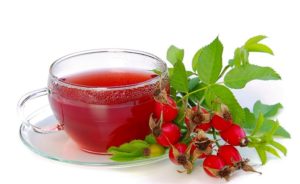
Brier for the joints
Now for the relief of symptoms in gout, arthritis, arthrosis used nonsteroidal anti-inflammatory drugs (NPZP) and glucocorticoids, but they show different side effects, including system.
For patients with osteoarthritis, scientists compared the indirect measures of reducing pain and restoring effect of two drugs – glucosamine hydrochloride and standardized rosehip powder.
turned, the plant effective, than glucosamine hydrochloride, reduces pain, especially in the long term (six months) studies of the human body.
It is virtually free of side effects and helps patients get rid of pain and other symptoms in inflammatory joint diseases.
Unlike many NSAIDs, no blood thickens rose, which is a significant advantage for patients with cardiovascular diseases.
When gout and other joint inflammation rose is not only inside, but as packs.
They can be made from oil, decoction or ointment, prepared with mashed fruit mixed with any animal fat.
When applying the composition on the night result appears in a few weeks.
Read: The broth hips gastric ulcer.
Chemotherapeutic potential of plants
Due to the content of flavonoids and polyphenols, rosehip extracts can reduce the growth of cancer cells.
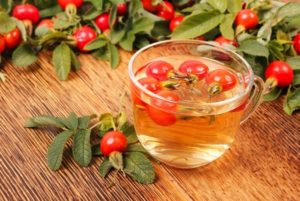
Rosehip with cancer
It has been suggested, that the anticancer effects associated with antioxidant and antiproliferative properties of these compounds.
In particular, Plants use reduces the development of cancer cells in malignant tumors of the breast, colon and cervix.
established, that in glioblastoma (malignant brain tumor) rosehip extracts can compete with anticancer drugs, officially used with chemotherapy.
To understand the potential antiproliferative chemotherapy as compared with plant scientists temozolomidom – is one of the current options for first-line chemotherapy, used in the treatment of glioblastoma.
Rosehip extract at a concentration 250 g / ml demonstrated a greater reduction in the proliferation of cancer cells compared to synthetic drug, However, co-administration of drugs inappropriate, as a synergistic effect was observed.
As an adjunct in chemotherapy can also use broth hips, but when it is cooking should take care of the preservation of vitamin C, flavonoids, responsible for antioxidant activity, and polyphenols, which contribute to its antiproliferative action.
Diabetes and obesity
When used by patients with diabetes and obesity agents plants, scientists say they have a tendency to reduce the load on the heart and blood vessels.
Rosa has long been used as a traditional treatment of diabetes, but now in this application there is evidence.
It has hypoglycemic effects, especially in patients with diabetes 2 Family.
Fruit extract reduces blood glucose levels shortly after its introduction, and actually slows weight gain and / or the accumulation of visceral fat without affecting food intake.
Preparations plants also produce a slight decrease in total cholesterol in the human body.
How useful hips broth for people with obesity?
According to research, Six weeks of daily consumption of drinks with crushed diluted in water and hips (in number 80 gram) people, obese with normal or impaired glucose tolerance, noted the following changes:
- a significant reduction in systolic blood pressure, elevated levels is often accompanied by tachycardia and hypertension;
- reduction in plasma total cholesterol;
- lower density lipoprotein, and optimizing the ratio of upward lipoprotein high density connections, which prevents the development of atherosclerosis.
At the same time hips had no effect on these indicators, a diastolic blood pressure, glucose tolerance, and plasma levels of HDL and triglycerides.
During experiments on laboratory mice it was found, that laboratory animals, who were given extracts of rose hips, showed a higher metabolic rate and burning calories, including during intense exercise.
So, After studies in humans plant can be made by nutritionists as a remedy for obesity and related metabolic disorders.
When you receive hips patients with diabetes need to remember, they contain carbohydrates.
Bread units in the product range from 0,33 XE 100 grams in decoction to 1,8 CW in fresh fruit.
Dried rose contains 4 HE, for comparison: 100 g granulated sugar – it 8,25 HE.
Cosmetic effects plants
For women rosehip oil – valuable cosmetic product, which features a number of useful features and almost no contraindications.
Due to the content of vitamins, antioxidants, unsaturated fatty acids, especially linoleic, it feeds, moisturizes the skin and reduces inflammation or accelerates healing of small injuries.
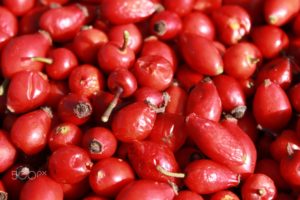
Rosa in cosmetics
The combination of antioxidant compounds and fatty acids helps to reduce visible stretch marks, scarring and hyperpigmentation.
Due to the large amount of vitamin C activates rosehip oil formation of collagen in the skin, which is useful for smoothing skin tone and elasticity of tissue preservation.
For these conditions,, as atopic dermatitis or eczema, anti-inflammatory and moisturizing properties of the product can accelerate skin renewal.
Kvertsetin – flavonoids, contained in wild rose, is able to suppress the activity of tyrosinase – enzyme, excess of which can lead to melanoma. Oil can also be used in hair care and nails.
It nourishes dry hair, prevents dandruff and strengthens nails, preventing their fragility.
Oil from the berries of plants can be added to products for skin care, hair or nails or used in its pure form as a moisturizer for the skin or hair mask.
It has good absorbency, that is convenient to use and allows you to quickly restore the moisture of the skin without bruises and then create oily film, but at the same time it has the ability to form a protective barrier to prevent dehydration.
In combination with honey, known for its antibacterial and nutritional value, rosehip oil can be used for acne and skin withering.
Read: Rosehip breastfeeding.
Contraindication
Dog-rose, With a wide list of beneficial properties, is not composed of toxic compounds, however some side effects and contraindications still present.
The most obvious reason for the ban and unequivocal acceptance hips is an allergic reaction.
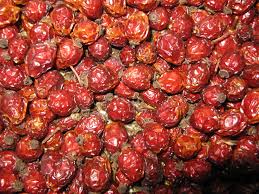
Contraindications hips
It often manifests redness, undead, lacrimation, gastrointestinal disorders.
exept this, there are some relative contraindications, many of which are associated with a lot of vitamin C.
The recommended rate of the vitamin in adults – 90 mg / day (it 30-50 g berries), but sometimes allowed to increase dosage to the upper tolerable intake level – 2 000 mg / day.
Exceeding this norm, vitamin and abuse in some diseases can cause complications.
Pregnancy and lactation. Many pregnant women use drugs and plants as a natural source of vitamin C..
However, the rose may benefit as, and damage, as a complex structure and the lack of reliable information about its safety are potential risks.
On the other hand, the plant can serve as a valuable source of vitamins and biologically active compounds, essential maternal and child, while toxicosis sour taste decoction or infusion relieve nausea.
When taken by pregnant women or, mothers need to caution, attentive to changes in health and reasonable limitation of admission.
Blood clotting and preparation for surgery.
Well Rugozіn, with a chemical group elahotaniniv, can slow blood clotting and increase the risk of bleeding in people with related disorders, and during surgery.
It is recommended to reduce the reception on hips 2 weeks before any major invasive surgery.
Mochekam'yana disease. Excess vitamin C is excreted in the urine in the form of oxalate – is one of the main components of kidney stones.
Uncontrolled use of drugs can lead hips due to chronic renal failure – CRI.
Deficiency of glucose-6-phosphate-dehydrogenase. This inherited disorder of erythrocyte membranes lose strength, red blood cells die quickly when driving on vessels.
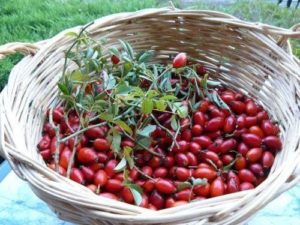
Damage from the hips
In this case, use large amounts of vitamin C is not recommended, as this may increase the risk of complications.
Frustration, related to violation of iron metabolism (hemochromatosis, thalassemia).
The iron content in the fruit or broth relatively small, but vitamin C increases the absorption of this element, considering that received drugs to treat the corresponding diseases can lead to complications.
sickle cell anemia. Some experts, exploring, How does vitamin C – zakyslyaye, concluded, that exposure to large doses of the compound there is the risk that the blood towards a more acidic pH.
This can lead to acute and chronic complications, uniting the term "sickle cell crisis". Scientific data on this issue is not enough, however, patients must carefully monitor their condition.
Some compounds, causing healing properties of rosehip, interact with drugs, leading to adverse effects and contraindications.
Receiving agents plants are not recommended to combine with drugs, comprising the following components:
- Aluminum. This substance is found in most antacids ( "Fosfalyugel", "Almagel" etc.). Vitamin C can increase the amount of digestible aluminum. Not all scientists agree, that this interaction can bring some harm to health, but to avoid possible risks is recommended to take rose hips on 2 hours before or 4 hours after antacids.
- estrogens. Vitamin C can increase estrogen assimilation, amplifying the effects and side effects of hormones.
- Flufenazyn (anxiolytic). The combination of a large number of hips with this drug may reduce the effectiveness of the latter, as vitamin C promotes rapid removal of the compound from the body.
- Lithium. Rosehip may reduce lithium conclusion from the body, which increases its content in the body and cause serious side effects when taking lithium preparations (Psychotropic drugs: Kvilonium, Kontemnol, Litosan other).
- Means, inhibiting blood clotting (anticoagulants: Heparin, aspirin, Warfarin and other). Rosehip is able to slow blood clotting, This enhancement of drugs increases the risk of bruises and bleeding. The same applies to plants, may affect blood clotting – Dyagel, carnation, garlic, ginger, ginkgo, ginseng.
- Aspirin. Large amounts of vitamin C can reduce decay and excretion from the body of aspirin, which increases the effects and side effects of the drug.
- Salsalat (NPZZ). Rosehip reduces the rate of excretion of the compound.
- Multivitamins. Concurrent use of dietary supplements, containing iron and vitamin C., can lead to hypervitaminosis. On the other hand, some experts recommend a diet supplemented with mineral additives, as it rose by diuretic properties partially removes calcium, magnesium and other essential minerals.
With care must be taken Rosehip people with diseases of the stomach, accompanied by high acidity.

Possible damage to hips
In such cases, it is recommended as an anti-inflammatory agent, but also ascorbic acid can lead to increased amounts of hydrochloric acid.
With increased tooth sensitivity after taking drugs plants need to rinse your mouth, otherwise, ascorbic acid will act on the enamel destructive, and, eventually, You can lose a tooth.
Growing evidence base for drugs hips, including extracts, teas, oils, provides, which is a traditional herbal medicinal product can bring significant benefit and does not have a lot of significant contraindications.
Although further studies are needed, Existing evidence suggests, that the plant may be an effective first line therapy in many diseases and is a viable replacement or supplement for conventional medicines.

